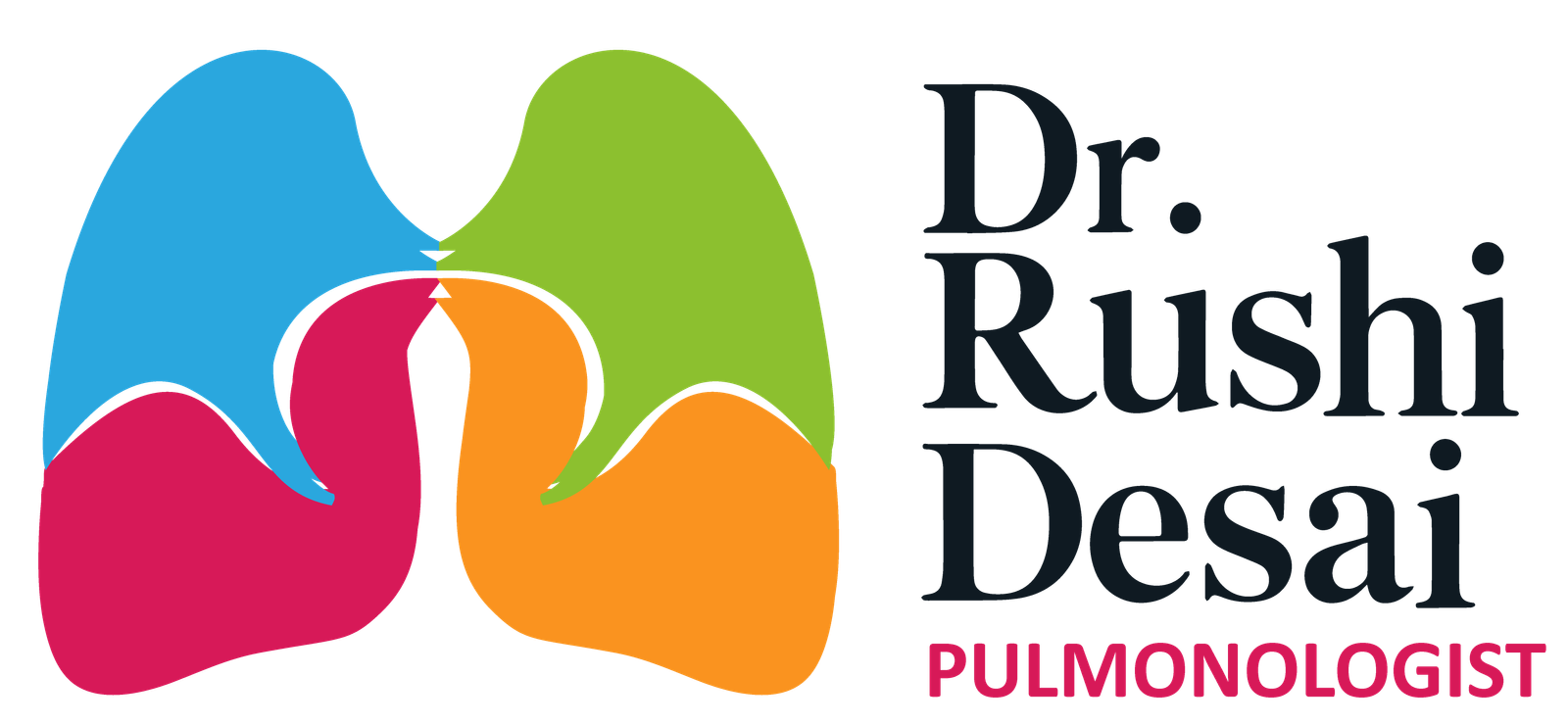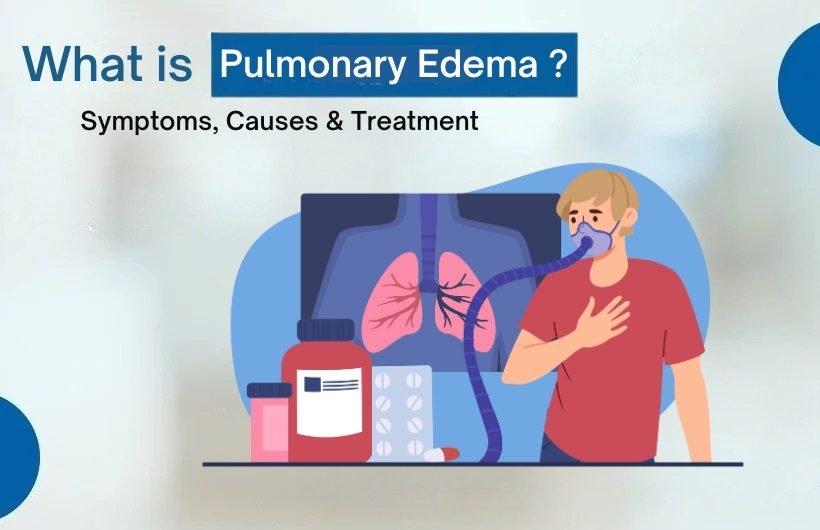Pulmonary edema is a serious medical condition that occurs when excess fluid builds up in the lungs, making it difficult for the body to breathe properly. Such untreated situations pose a perilous threat to patients because they put their lives in danger. This blog describes pulmonary edema from a medical perspective including symptoms and origins as well as practical treatment methods. Patient recovery from respiratory problems in Ahmedabad begins with consulting the local pulmonology specialists practicing within the city.
What is Pulmonary Edema?
Pulmonary edema refers to the accumulation of fluid in the lungs, which impairs the exchange of oxygen and carbon dioxide in the bloodstream. The human respiratory system manages two vital roles through the lungs because they move oxygen into blood-streams while pulling carbon dioxide from them. Fluid entering the alveoli known as air sacs creates ineffective oxygen and carbon dioxide exchange in the lungs thus inducing respiratory complications and inefficient breathing.
Symptoms of Pulmonary Edema
Different symptoms emerge in pulmonary edema according to the extent of disease severity. Symptoms of pulmonary edema are displayed in two main ways:
1. Shortness of breath serves as the primary symptom which becomes evident while the person is active or when sitting at rest.
2. Mucus from the lung shows pink coloring along with fluid stains because pulmonary edema collects fluid in the lungs.
3. The usual quick breathing pattern of pulmonary edema patients happens because their oxygen absorption remains insufficient.
4. Listening to wheezing sounds results from fluid build-up that occurs as people inhale.
5. People experiencing pulmonary edema need a sufficient oxygen supply as it triggers fatigue which leads to both exhaustion and weakness.
6. People experiencing pulmonary edema often develop swollen body parts such as their lower limbs or stomach together with facial swelling.
If you notice any of these symptoms, it’s crucial to consult a lung specialist in Ahmedabad to get an accurate diagnosis and appropriate treatment.
Causes of Pulmonary Edema
There are two main types of pulmonary edema: cardiogenic (caused by heart-related issues) and noncardiogenic (resulting from other factors). Knowledge about pulmonary edema origins allows for better management decisions for this form of illness.
Cardiogenic Pulmonary Edema
The most prevalent type of pulmonary edema develops when the heart lacks efficiency in blood circulation. The blood pressure rises and blocks the veins which results in fluid moving from the bloodstream into the lungs. The major factors leading to the development of cardiogenic pulmonary edema include:
1. The lungs accumulate fluid when heart failure weakens the heart to the point where blood pumping becomes ineffective.
2. The condition blocks arteries in the heart which reduces blood circulation and causes heart malfunctions resulting in pulmonary edema.
3. Prolonged hypertension damages heart muscles until it develops into a heart failure that produces pulmonary edema.
4. The failure of heart valves to operate properly blocks blood circulation and enables lung fluid to accumulate.
Non-Cardiogenic Pulmonary Edema
The form of pulmonary edema that develops through non-cardiovascular causes affects the lungs independently from heart failure. Some of the causes include:
1. Pneumonia together with other lung infections causes blood vessel permeability to increase thus creating fluid leakage into alveoli spaces.
2. The physical damage to the lungs or chest results in fluid accumulation within the lungs.
3. Kidney failure creates problems for proper filtration so the body retains fluid that accumulates in the lungs.
4. Exposure to poisonous airborne substances including smoke will harm lung tissue and result in pulmonary edema.
5. No organism can effectively manage high-altitude pulmonary edema despite treatment at elevated altitudes.
People should obtain pulmonary edema treatment from experts such as pulmonologists to efficiently control this condition.
Treatment for Pulmonary Edema
The treatment for pulmonary edema depends on the underlying cause, but it generally involves a combination of therapies aimed at relieving symptoms, improving oxygen levels, and addressing the root cause of the fluid buildup.
1. Oxygen Therapy
One of the first pulmonary edema treatments is providing supplemental oxygen to help the patient breathe more easily. The method proves vital for treating people who face extreme breathing difficulties combined with oxygen deficiency. The method of oxygen delivery depends on the patient’s needs with either a nasal cannula or face mask for treatment.
2. Diuretics
The medical category of substances known as diuretics functions as “water pills” when used to flush excess fluid from the body. When the body produces more urine through diuretics the medication reduces excess lung fluid which helps alleviate pulmonary edema symptoms.
3. Medications to Improve Heart Function
The treatment of pulmonary edema caused by heart failure often includes medication prescriptions of ACE inhibitors with beta-blockers and angiotensin receptor blockers (ARBs). Blood pressure levels decrease while heart workload reduction happens as these medications enhance the heart’s performance to move blood effectively.
4. Mechanical Ventilation
The individual requires mechanical ventilation since oxygen therapy cannot sufficiently manage their condition. The device directs oxygen to the lungs and eliminates carbon dioxide from patients through its ventilation system.
5. Treating the Underlying Condition
The prevention of pulmonary edema treatment for the original disorders including heart failure and pneumonia along with kidney disease. Healthcare providers handle persistent medical conditions by applying both therapeutic medications and operative measures and lifestyle modifications to particular situations.
Individuals who experience pulmonary edema because of heart problems need to team up with a pulmonary specialist from Ahmedabad as well as a heart specialist to develop a full treatment approach.
Pulmonary Edema Treatment at the Best Pulmonologist in Ahmedabad
Customers can receive excellent pulmonary edema care from Dr. Rushi Desai who reigns as a respected pulmonologist with outstanding competence. Dr. Desai serves as an expert lungs specialist in Ahmedabad where he evaluates and treats respiratory conditions, specifically pulmonary edema together with his extensive professional expertise in the field.
Dr. Desai takes a personalized approach to each patient’s pulmonary edema treatment ensuring that the root cause of pulmonary edema is addressed and that the patient receives the most effective therapies. Dr. Desai will assist patients with any type of pulmonary edema diagnosis by recommending optimal treatments as well as helping them maintain effective control of their condition.
Prevention and Lifestyle Changes
A person who makes healthy lifestyle choices decreases their odds of getting heart failure and consequently prevents pulmonary edema development. Some preventive measures include:
1. People who manage their blood pressure well avoid heart failure alongside other cardiovascular problems.
2. A healthy weight reduces the burden on your heart thus preventing heart-related pulmonary edema.
3. Eating heart-healthy meals from a nutrition plan that includes fruits, vegetables, and whole grains together with lean proteins protects heart health while avoiding fluid accumulation.
4. Physical exercise establishes healthy lung and heart systems which help decrease pulmonary edema risk.
5. Pulmonary edema develops more frequently when individuals smoke or drink alcohol because smoking damages both the heart and lungs.
Conclusion
The urgent need for proper diagnosis and treatment exists because pulmonary edema stands as a severe medical complication. A pulmonology consultation in Ahmedabad becomes essential for patients with pulmonary edema regardless of its heart-related or non-heart-related origins to obtain correct medical care. Dr. Rushi Desai operates as a leading lungs specialist in Ahmedabad where he assists patients to understand pulmonary edema through expert diagnosis and guide their treatment choices.
If you or a loved one is experiencing symptoms of pulmonary edema, don’t wait—reach out to Dr. Rushi Desai, the pulmonologist in Ahmedabad, for an expert consultation. With the right treatment and care, you can manage pulmonary edema and improve your quality of life.






